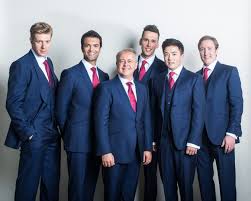St Nicolas Church, Friday 21 October 2016
A concert by the Kings Singers is always something special. Since their foundation by six choral scholars at Kings College, Cambridge in 1965, the group has won international renown for their total professionalism and lively musicianship. On October 21st, 2016, the Kings Singers performed in St Nicolas, Pevensey to mark its 800th Anniversary.
The Kings Singers began their programme with serious baroque composition, 19th c. French songs and a modern work written for them by John McCabe. Byrd’s canonical ‘Viri Galilaei’ was sung with brisk lightness of voice. Byrd’s music for the Anglican Church has been sung without interruption since the 16th century, and the evening opened with ‘Sing Joyfully’. This proved to be one of the most popular and durable anthems of the Elizabethan age. The piece presents four verses of Psalm 81 in flawless counterpoint. The opening of “Sing joyfully” arrived with a series of upward leaps sung by the counter tenors, alto, and tenor. For the very last fragment of text, which pronounces God’s “law” for the celebration of festivals, Byrd crafts the most extended counterpoint of the piece, which the King’s singers extended beautifully to the final climax.
In contrast, ‘Sicut Lillium’ by Palestrina was characterised by the solemn richness of harmony and sinuous weaving of melodic strands. The modern monasticism of François Poulenc was demonstrated by the scrunching harmony and sweet texture of ‘Four Short Prayers’. His countryman Claude Debussy offered ‘Trois Chansons’, old words in a modern setting, clear, sharp and comprehensive, with one song in particular, effective over a drone bass.
We were treated to Palestrina’s ‘Salve Regina’. Palestrina’s writing represents the culmination of Renaissance polyphony. The King’s Singers performed the piece in its original Latin which conveyed this Gregorian chant magically. Intonation, which is critical, was faultless. Sung after Compline the piece can be traced to the monastic practice of intoning it in chapel and chanting it on the way to sleeping quarters at the end of the day. The performance suited the church’s wonderful acoustics for choral singing beautifully.
William Byrd’s –‘Viri Galilaei’ gave the opportunity for the wonderfully rounded tones of Jonathon Howard’s bass voice to come to the fore as the foundation on which the interweaving upper parts could shine in this sacred motet. This piece being part of a larger Mass could only tease us with a flavour of the whole much longer work. Nevertheless this sumptuous performance will stay long in the memory for its delicacy and reflective calm. We were then treated to another early motet by Palestrina, the ‘Sicut lillium’, written for five voices. Again an appropriately early musical experience from a composer who specialised in writing sacred music and who had an influence on so much the development of church music
We moved on three hundred and fifty years to hear a Francis Poulenc – Quatre petites prières de Saint Francois d’Assise, originally composed for the his grandnephew a Franciscan monk. Largely sung in unison the piece demands great breath control and dynamic precision, both of which were effortlessly presented with development into some delicately delicious choral chords which evoked great spirituality, if not on occasion sombre reflections.
Composed by another Frenchman and a contemporary of Poulenc, we heard next Claude Debussy’s ‘Trois chansons de Charles d’Orléans’. The first two songs were performed with full voices before the lively opening of the third song which had some typical ‘clashing chords’ all delivered with authority and confidence. This was a marvellous performance of Debussy’s only choral piece. A rarity well- performed.
Bringing us up to the c21st the King’s Singer’s performed a piece commissioned by the BBC for its first performance by the King’s Singers in the 2002 BBC Proms, forming part of “The Oriana Collection” to celebrate the Golden Jubilee of Queen Elizabeth II. Opening with long glissando voices before the lower voices bring discordancy to proceedings. This is a very unusual composition which had everyone on the edge of their seats as the vocal interweaving knitted a rich texture of sounds on which the first half finished.
The second half delivered a totally different side of the King’s Singers’ repertoire with a selection of arrangements by Gordon Lightfoot of Flanders and Swan songs all delivered with the panache and wit for which the ensemble is renowned. Flanders and Swan, Spike Milligan, a Greek version of ‘Old MacDonald’ (with effective vocal sound effects), and African spirituals were all performed with wit and verve. ‘A transport of delight’, re-arranged by Gordon Langford, was a triumph of witty horsepower (97, to be precise) and tingling bells: the clever ditty lost none of its fun and sparkle in a version for six unaccompanied singers. A packed audience chuckled mightily before feeling a touch of melancholy at the doomed romance between a well- bred Honeysuckle and rampant Bindweed.
A surprise encore paid tribute to Percy Granger who holidayed for many years close to the church. Percy Grainger is now mainly remembered for ‘Country Gardens’. His 1918 arrangement of this English Morris Dance is still well-known and the King’s Singers rendition completed a memorable evening’s entertainment in a church celebrating its 800th anniversary, in unquestionable style.
There doesn’t seem to be anything that the Kings Singers can’t sing, moreover, with their hallmark perfect pitch, exact intervals and precise enunciation. The audience loved them and refused to let them go without encores, programme signing and drawing raffle tickets. They’re wonderful musicians, talented performers and gave all present a memorable evening.

